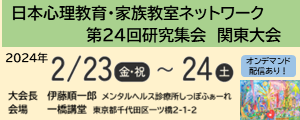大会長講演
「家族療法をもっと身近なものに」
講師:児島達美(本学会長/KPCL代表)
特別講演①
「人生100年時代の家族のかたち」
講師:山田昌弘(日本家族社会学会長/中央大学教授)
特別講演②
「家族療法と国際交流、この40年とこれから」
講師:田村毅(高山村こころの診療所/AAFT:アジア家族療法学会長/本学会副会長)
海外オンライン講演
9月17日(土)9:30~11:30
Children and concerning sexual behaviour: A narrative therapy approach to children and their families
性的問題行動と子どもたち:子どもと家族へのナラティヴ・セラピー
Lecturer: Paul Flanagan (University of Waikato, New Zealand)
Interpreter: Yukari Barnard (NPACC: Narrative Practice and Coresearch Centre)
Moderator: Masaya Sakamoto (Kobe Shoin Women’s University)
講師:ポール・フラナガン(ワイカト大学・ニュージーランド)
通訳:バーナード紫(ナラティヴ実践協働研究センター:NPACC)
司会:坂本真佐哉(神戸松蔭女子学院大学)
This lecture will include both a pre-recorded presentation as well as a live discussion.
Narrative therapy developed within the practice of Family Therapy by Michael White (Australia) and David Epston (New Zealand) (White & Epston, 1989, 1990). The University of Waikato (NZ) counsellor education programmes are known for their distinctive orientation in teaching narrative approaches to counselling and therapy (see Crocket et al., 2017; Monk et al., 1997). Particular attention is given to understanding cultural and gendered contexts of people’s lives and their stories (see Waldegrave et al., 2003).
This lecture presents key ideas about the theory and practice of narrative therapy with families, including particular attention to the ways that language shapes and constructs a person’s identity and self-understanding. I will then describe the application of a narrative therapy approach with children and families. Examples will be given about therapy with children and their families, where a child has participated in sexual behaviour with other children. This behaviour can be seen as concerning: it may be viewed as normal and exploratory, or possibly harmful and ‘too adult’ for children, or it might be abusive. Drawing on 25 years of practice and research in this area, I will share some examples of satisfying and difficult areas from my therapy practice with children and their families. I will also share outcomes of research in this area of understanding childhood and sexuality. I will then welcome your questions about how narrative therapy offers supportive approaches to families and children.
この講演会では、事前録音されたプレゼンテーションとライブディスカッションを行う予定にしています。
ナラティヴ・セラピーは、マイケル・ホワイト(オーストラリア)とデビッド・エプストン(ニュージーランド)によって、家族療法の実践の中で発展してきました(ホワイト&エプストン、1989、1990)。ワイカト大学(NZ)のカウンセラー教育プログラムは、カウンセリングとセラピーへのナラティヴ・アプローチを教える際、独特の方向性を持つことで知られています(Crocketら、2017;Monkら、1997を参照)。特に、人々の生活とそのストーリーを文化的・ジェンダー的文脈から理解することに注意を払っています(Waldegrave et al.2003参照)。
この講演では、家族に対するナラティヴ・セラピーの理論と実践について、特に言語が人のアイデンティティと自己理解を形成し構築する方法に注目することを含め、重要だと思える考え方を提示します。次に、子どもや家族に対するナラティヴ・セラピーのアプローチの適用について説明します。また、子どもが他の子どもと性的な行動に及んだ場合の子どもとその家族とのセラピーについて例を挙げて説明します。このような行動は、正常で探索的であると見なされることもあれば、有害で子どもにとって有害で「過度に成熟している」と見なされることもあり、また虐待と見なされることもあります。この分野での25年にわたる実践と研究をもとに、私が子どもやその家族と行ってきたセラピーの中から、満足のいく例と困難な例をいくつか紹介します。また、子どもとセクシュアリティを理解するためのこの分野の研究の成果も紹介します。そして、ナラティヴ・セラピーがどのように家族や子どもへのサポートとなるのか、皆さんからの質問をお待ちしています。



